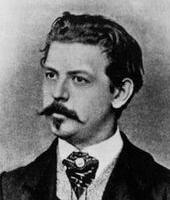Vilém Blodek
datum narození: 03.10.1834datum úmrtí: 01.05.1874
místo narození: Praha
místo úmrtí: Praha
český skladatel, hudebník a pedagog.
Pocházel z chudé rodiny, studoval na německém piaristickém gymnáziu v Praze. Učil se na klavír u českého skladatele Alexandra Dreyschocka. V letech 1846-52 studoval na konzervatoři u Antonína Eisera flétnu a u Jana Bedřicha Kittla skladbu. Po ukončení studia působil dva roky v polské Haliči jako soukromý učitel hudby. Po návratu do Prahy se živil jako koncertní klavírista, učitel hudby a krátce i jako sbormistr mužského peveckého spolku, pro který napsal řadu vlasteneckých sborových děl. V roce 1860 se stal profesorem hry na flétnu na pražské konzervatoři, napsal i vlastní školu hry na flétnu. V roce 1864 pracoval společně se Smetanou na hudbě k Shakespearovským slavnostem. Roku 1865 se oženil se svou žákyní Marií Doudlebskou. Jeho dlouhodobé přepracování nakonec vedlo k nervovému zhroucení. Poslední čtyři roky svého života pobýval ústavu pro choromyslné v pražských Kateřinkách, shodou okolností na stejném místě, kde o 10 let později zemřel i Bedřich Smetana.
Blodek skládal hudbu od svých 13 let, stylově inspirován zejména svým učitelem Kittlem, Mendelssonem a německými ranými romantiky. Jeho nejambicióznějším koncertním dílem byla Symfonie D moll. Mezi nejzdařilejší díla patří flétnový koncert. Nejznámějším Blodkovým dílem byla jednoaktová komická opera V studni na libreto Karla Sabiny, uvedená v Prozatímním divadle roku 1867, která ve své době soupeřila v oblíbenosti se Smetanovou Prodanou nevěstou. Blodek pracoval na "velké" opeře o 3 dějstvích Zítek (rovněž na Sabinovo libreto), podařilo se mu však dokončit pouze první a část druhého dějství. Blodkova vdova prosila Smetanu, aby Zítka dokončil, ten však, v té době již rovněž nemocen, to odmítl. Nakonec se opera dočkala dokončení od skladatele F.X.Váni a byla poprvé uvedena r. 1934 ke 100.výročí Blodkova narození.
Dílo:
- Dechový sextet , 1847
- Symfonie D moll , 1859
- Flétnový koncert , 1862
- scénická hudba asi k 60 českým a německým divadelním hrám (po roce 1858)
- vokální tvorba (vlastenecké mužské sbory i chrámové skladby)
- Komorní hudba (zejména skladby pro flétnu a klavír)
Prameny:
Ukázky:



